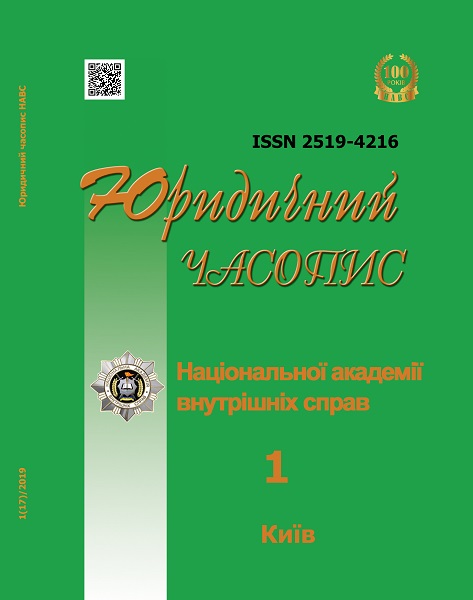Aхiological Component of Evidence in the Constitutional Court Process
Abstract
The article is devoted to the topical low-researched issues related to the definition of the essence of the axiological component of evidence in the constitutional court process and its role in adopting a just and reasoned decision in the case. The theoretical basis of the research are the works of domestic and foreign scholars in the fields of philosophy and constitutional law, as well as acts of the domestic constitutional jurisdiction body. The purpose. The purpose of the research is to determine the basic fundamentals and principles of applying the methodological tools of axiology as a branch of science of philosophy of law when forming the evidence base in the constitutional court process as the basis for the adoption of a just and reasoned decision of the constitutional jurisdiction body. The scientific novelty of the publication is in the fact that the author for the first time conducted a comprehensive study of issues related to the axiological component of evidence in a constitutional legal process. Thus, the materials presented in this article are, in fact, the first scientific study of axiological philosophical methods of obtaining, evaluating and using evidence taking into account the specifics of legal proceedings in the bodies of constitutional jurisdiction. According to the results of the research, the author conclusions that: firstly, the concept of «universal values» as a philosophical and legal category and a social phenomenon reflects certain aspects of the phenomena of reality, associated with the social and cultural activities of individual and society. These, as well as the issues related to the selection by people of the area of their activities and the nature of their actions are researched by philosophical doctrine – axiology; secondly, there is no unambiguous approach to the definition of the concept of «value» in the science of the philosophy of law. As a rule, fundamental values of constitutional level include freedom, responsibility, equality, human and citizen’s rights and fundamental freedoms. These values are in any time and space, and natural law reflects their universal set; thirdly, the axiological component of the evidence in the constitutional court process is to determine the degree of conformity of the subject of the research of the essence of universally recognised in the society constitutional values, in particular, in the context of their implementation and protection, based on the philosophical foundation of constitutional axiology. In a modern democratic, law-based and social state the system of constitutional values is based on the principle of organic combination of traditions, customs, mental criteria of culture, morality and religion along with the internationally recognised principles of the relationship between the individual and society (in the form of the state and civil society institutions).
Keywords: axiology; civil society; evidence; state; universal values; freedom; justice.
Downloads
Abstract views: 180 PDF Downloads: 119
Copyright (c) 2019 Law Magazine of the National Academy of Internal Affairs

This work is licensed under a Creative Commons Attribution-NonCommercial-NoDerivatives 4.0 International License.
- Authors reserve the right to authorship of their own work and transfer to the magazine the right of the first publication of this work under the terms of the Creative Commons Attribution License, which allows other persons to freely distribute published work with mandatory reference to authors of the original work and the first publication of an article in this magazine.
- Authors have the right to enter into separate additional agreements on non-exclusive dissemination of the work in the form in which it was published in the journal (for example, to post an article in the institution's repository or to publish as part of a monograph), provided that the link to the first publication of the work in this journal is maintained.
- The journal's policy allows and encourages the posting of articles by authors on the Internet (for example, in electronic storehouses of institutions or on personal websites), both before the submission of this manuscript to the editorial office and during its editorial processing, as this contributes to the creation of a productive scientific discussion and positively affects the efficiency and dynamics of citing the published work.




